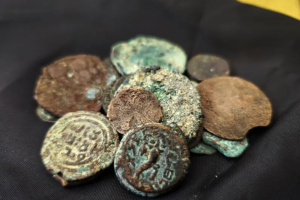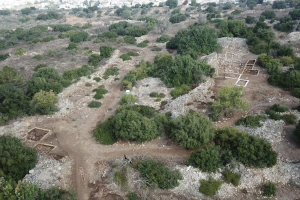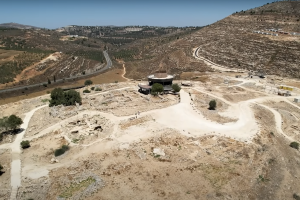Ancient lead weight of fair-trade official found by Israel's antiquities theft unit
An ancient lead weight weighing one mina, a measurement mentioned in the Bible, has been recovered from illegal traders in Jerusalem. Ironically, the weight bears an inscription indicating that it belonged to an official responsible for fair trading and the prevention of fraud.
The weight, which dates back to 147 or 148 BCE when the Greeks were ruling, bears the name “Heliodorus son of Apollonios, Agoranomos.” It is understood from the word “agoranomos” that this man Heliodorus, son of Apollonios, was responsible for regulating weights and measures as a supervisor of commercial standards in a city in Israel.
According to the Israel Antiquities Authority (IAA), another weight bearing the name of what may have been the father of Heliodorus was previously discovered, dating to around 170 BCE – about 20 years earlier – and inscribed with the name of another agoranomos, Apollonios. Similarly, a weight and a measuring vessel dated five years later (around 143 BCE) are inscribed with the name Antipatros, son of Heliodoros, who also held the position of agoranomos.
“It is well known that in the ancient world, government offices – including that of the agoranomos – often tended to pass within families, from father to son,” explains Ido Zangen of the IAA.
“Nevertheless, such offices did not always pass directly from father to son, and these names were not particularly rare in Maresha. There is therefore no absolute certainty that the present weight originates from this site. This hypothesis is currently being examined by the Israel Antiquities Authority. If it proves correct, it would constitute a rare and significant discovery regarding politics and administration in the ancient world.”
Zangen continued, “The Greek names of Heliodorus and his father, Apollonios, attest to a Hellenized population. Both names are connected to the Greek sun gods – Helios and Apollo – and indicate a cultural-religious affinity with the Hellenistic culture that ruled the region at that time. These names were especially common in Idumea, where the local god ‘Qos’ was identified with the Greek sun gods.”
Heliodorus was a common name in Maresha, the capital of Idumea, during the Hellenistic era, and other items related to the office of the agoranomos have also been discovered from the same time period and bearing the same names.
In the past, a well-known royal inscription in Greek dating to 178 BCE was discovered in the area of Maresha, mentioning another Heliodorus – Heliodorus the Dioiketes – the finance minister, head of the king’s council of ministers, who is also mentioned in II Maccabees 3. This Heliodorus was sent by King Seleucus IV to confiscate funds from the treasury of the Jerusalem Temple. Some scholars attribute this action as one of the causes of the Hasmonean Revolt against the Greeks.
In addition to the name of the official, his role, and a Greek letter “M” to designate the weight of a mina, there is a small depiction of a dolphin in the bottom left corner of the square weight, thought to represent the city the weight came from, although experts are still studying the artifact’s symbolism to understand what it means.
A mina was a unit of measurement in the ancient world equivalent to one hundred Greek drachmas. It appears in the Bible several times, most often in terms of the weight of silver and gold given to build the temple in Jerusalem. For example, it is recorded in 1 Kings 10:17 that three minas of gold went into each shield made in the time of King Solomon. The mina also appears in the New Testament in Luke 19. Jesus teaches the Parable of the Ten Talents (which can also be translated Ten Minas) in which servants are judged by how well they steward the differing amounts they are given, measured in minas.
The IAA's Theft Prevention Unit found the lead weight after sending inspectors to investigate an antiques shop in Jerusalem, having received intelligence information. Once the item was identified and recovered, the team set to work trying to track down the middlemen and looters responsible for illegally taking and selling the artifact.
According to Ilan Haddad, Head of Antiquities Trade Supervision at the IAA, “The removal of an archaeological artifact from its site without a proper excavation results in the loss of invaluable historical information. Had we found the artifact in its precise archaeological context, it could have enriched our historical knowledge significantly. At present, unfortunately, we can only speculate from which ancient city the item was looted and what its context was."
"The law prohibits antiquities dealers from purchasing artifacts from unknown sources. This constitutes a criminal offense. The IAA works to prevent looted artifacts from reaching antiquities shops, to apprehend antiquities looters in the field, and to bring them to justice,” he said.
Rabbi Amihai Eliyahu, Israel’s Minister of Heritage, agreed saying, “The struggle against antiquities looters and the trade in antiquities helps to preserve the cultural treasures of the State of Israel. Every historical artifact enables us to piece together additional parts of the historical puzzle of the people of Israel and the Land of Israel.”

Jo Elizabeth has a great interest in politics and cultural developments, studying Social Policy for her first degree and gaining a Masters in Jewish Philosophy from Haifa University, but she loves to write about the Bible and its primary subject, the God of Israel. As a writer, Jo spends her time between the UK and Jerusalem, Israel.
You might also like to read this:
















